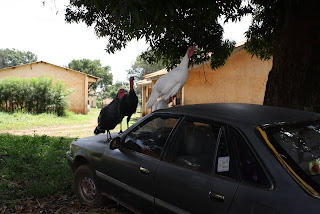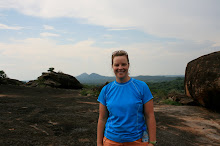
I had a great day today. I have mentioned before that as part of the IC Legacy Scholarship, each student is partnered with a mentor, who builds a relationship with the student, his/her parents, and his/her school. This allows the students greater success because they receive support from all of those areas; I think it also works to build greater community. Today I got the opportunity to shadow a mentor named Oyella Betty.
Betty is forty years old and has 3 children, two boys who are in S1 and S2 and a girl who is in P1. She is not married, but the father of her children is currently working as a builder in Sudan. She has not seen him in two years. She is the eldest child of 7 and helps her other siblings, and she is amazing. Before she became a mentor for Invisible Children, she was a political education and geography teacher at Sir Samuel Baker.
I met her at 9:00 am at the Invisible Children office. While there, I met several other mentors. Each mentor has a caseload of about 24-25 students; ideally the mentor is assigned to a school instead of a student. So if a student transfers to another school, he/she then is assigned a new mentor. Everyone is really nice, and one of them, Richard, was one of the roadies who visited the United States and was based in the Colorado area. He and I had a conversation about how beautiful that area was and what a great time he had. Betty then suggested that I change into trousers as we would be travelling into the bush. I quickly made the change and returned to the office. Betty gave me a helmet, which is a nice change from riding on a motorcycle without one at high speeds, and we were off.
Our first stop was the gas station to get petrol and some snacks. While there, an older woman on crutches walked into the store. As she passed me, I greeted her in Luo. She stopped to speak to me and to correct me in the greeting that I used. Now let me tell you something about Luo. To greet someone, there are about 10 different sayings you can use, and while most can be used at any time of the day, some depend on whether it is morning or evening. Well, when greeting her, I used the correct saying, but she wanted me to use another one, so she gave me a language lesson. She was a former teacher, so to me, it proves the saying, “once a teacher, always a teacher.”
Once we got the petrol, we headed to our first stop, the Ugandan prison in Gulu. We were there to visit the father of one of the scholarship students. Betty had spent about a week trying to track down the girl’s family and she finally heard that he was in the prison over a land dispute. We arrived at the prison and walked over to a group of benches under a mango tree. There were several others waiting along with a guard taking the visitors’ names down. Betty told me to sit on the bench, and she went to go speak with the guard. As I sat down, I could feel about 10 sets of eyes on me, and I knew what they were thinking: “What is this white woman doing here and who is she visiting?” Once Betty checked in the with guard, she said that she was going to try to find out what the charges were but that I should remain there since “I might scare the people.” So I continued to sit, and Betty returned about 10 minutes later. She said that we were in the wrong area since we were on the female side. We walked down to the newer section of the prison, which houses the male inmates. Betty knocked on the steel door, and we were let inside. This section had a concrete floor and would be big enough to drive a truck through. They closed the steel doors behind us and told us to sit on the bench against the wall. There was a chalk line surrounding the benches. On the opposite side of the steel doors were gates that led through to an open courtyard where some of the inmates were. The inmates were playing soccer, volleyball, running, or just hanging out. The guard rapped on the metal gates, and an inmate came over. He asked the inmate to find the man we were looking for, and shortly thereafter, the man came back. They let him into the “visitation area”, and he came over to us. While we sat on the bench, he kneeled on the other side of the chalk line. And that was how our discussion began. Betty and the man spoke mostly in Luo; but the gist of the conversation was this. Years ago, the man and his family were granted a piece of land by the owner to live on. However in recent years, as the owner’s family has grown, he wanted the land back from this man, who, by the way, is a primary school teacher. And the man has refused. Betty said that it did not sound very fair, and I asked her if it was a “he said, he said” situation to which she replied yes. She and the father feel confident that it will be resolved at the next court date in a week, but I wonder. After he left, Betty told the guards that I had a couple of questions about the prison, which was a little awkward. I asked why the guards do not carry weapons inside the prison; they responded that if a prisoner overtakes a guard, there is no weapon for the prisoner to get. I also asked if the prisoners are separated by the severity of the crime, and the answer is no. So the teacher who is in a land dispute is in the same area as those who have committed violent crimes. The guard asked if it was the same as the prisons in the U.S., and I replied that I had never seen a prison in the U.S except on television. They all seem shocked at that comment. I tried to ask one more question, but I think they became uncomfortable and told us we would have to go through the public relations office. And that was our cue to leave. Betty thanked them graciously, and we headed to our next stop.
We headed out of town to visit the parents of another scholarship recipient named Nancy. Both of Nancy’s parents are HIV positive. Fortunately for Nancy, she is negative. Their home is off of the road to Layibi down a dirt path in the bush. There are two huts and one two-room house. It was this house that we were invited into after removing our shoes. Betty, the father and I sat on furniture; the mother and a friend sat on the floor even though there were plenty of chairs. The father does not look healthy at all; Betty mentioned that not only is he HIV positive, but he is also diabetic and has epileptic seizures. The mother looks very healthy. Again, most of the conversation was in Luo, and every once in a while, all of them would look at me and smile. Not sure what they were saying, but I am going to assume it was friendly. They were very welcoming and offered me some food gifts as is the custom here, but Betty quickly intervened and said it would not be good for my stomach. It was really great to visit a typical home and meet those outside of my circle here. Again, the warmth and hospitality is unparalleled; this family has so little and were still willing to give what they had.
On our way to the final stop of Koro SS to visit Nancy, we stopped at St. Joseph’s Layibi, one of the IC schools that we are teaching in. Catherine, Patrick, and Allison were there, and they gave us a tour of the grounds. The school is four times the size of Keyo; it is a male boarding school that houses 1300 boys. Betty’s two older boys are there, and so I got to meet them and she was able to check up on them. They were so cute, but I think are typical boys as they replied to her questions in monosyllables. I have had the opportunity to see several schools this trip, and it is so great to be able to compare and see the differences.
Our last stop was Koro SS, which is out in the middle of nowhere. It was created after the IDP camp was built in that area. It is very small. We met with the head teacher who then took me to the Staff Room to introduce me around and offered the opportunity for us to ask questions of each other. The teachers had many questions for me about education in America; they ranged from teacher motivation, to daily schedule, to student behavior and discipline, and teacher schedule. They were shocked when I mentioned that American teachers teach all day with the exception of a planning period. Ugandan teachers have long breaks during the day and may have some days that they do not teach at all. Betty said, “you must get exhausted doing all of that teaching.” I responded that American teaching is more student driven. Very rarely does the teacher stand up and lecture all day every day. It was an interesting conversation to have with them. We then met with Justin and Nancy, two of IC Legacy scholarship recipients. Betty asked them how they were doing in school and out of school. I think they were a little shy because I was there, but they were so polite and liked knowing someone cared about them. We talked about favorite foods; Justin’s favorite food is okra, and he hates eggplant. Nancy likes beans and hates mushrooms. Both of them needed to improve their grades, and so Betty offered some strategies to help them do that. The first strategy was to talk to the teacher, which in America would be easy, but I do not think it is so easy in Uganda. The teacher- student relationship here is much more formal; they do not foster the same relationship that we do in the States. I feel the teachers fear that if they are not seen as an authoritative figure, they will not be effective. However I think it is possible to still maintain control and foster a better relationship. That is one of the aspects that the American teachers work on with our partner teachers here.
We headed back to town and stopped at a gas station to grab snacks. While there, a woman selling children’s clothing came over to our table and proceeded to try to sell children’s clothing to Betty. Betty chose an outfit for her 6 year old daughter. The original price was 15,000 shillings; at the end of the haggling, Betty paid 9,000 shillings, or about $4.50 for the skirt, top and belt. I should probably mention that this outfit was a brand new outfit from Gymboree with the tags still on. Only in Africa…
All in all it was a fantastic day. I learned so much about the culture here and I continue to be impressed with the friendliness that is exhibited. The Ugandans truly care about each other and want to make their lives better. I am reminded of the Phoenix rising out of the ashes.


























